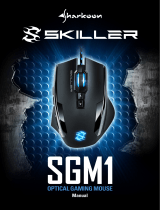
12. Macro Manager
In the Macro Manager, macros with up to 50 key com-
mands can be recorded, edited and deleted. Macros are
independent of game profiles but can be used for any of
these profiles after they have been recorded. Before a
macro can be used, it must be assigned to a mouse but-
ton in the menu “Button Assignment“.
Please note: Depending on the keyboard and keyboard
layout, certain keys are excluded from the macro recor-
ding.
Select Macro: Here, macros can be created and dele-
ted. To create a macro, make a right click in the field
under “Select Macro“. You then have the possibility to
create a new macro or to import a macro which is alrea-
dy saved on the PC. If you wish to create a new macro,
you will be asked to give this a name.
Macro Editor: The “Macro Editor“ field displays the se-
quence of the key inputs during the recording of a macro.
To start recording, click on “Start Recording“ and then
type in the key commands which are to be recorded. To
stop recording, click on “Stop Recording“. You can now
see all the recorded key inputs in the “Macro Editor“
field. Each recorded command is listed twice in the edi-
tor: once for pressing the button and once for releasing
it. If the relevant option has been activated, the duration
and delay of key inputs will also be displayed.
Options: On the right, next to the macro editor, you can
activate the option “Record Delay between Keystro-
kes“. With this option, duration and delays when pres-
sing and releasing the keys will be recorded and shown
in the recording in milliseconds. In addition, you can
choose that the macro is continuously repeated while
the mouse button is pressed down. Or, alternatively,
there is the option to begin a continuous repetition of
the macro by clicking the mouse button and ending the
repetition when the button is clicked again. With the
last option, you can determine an exact number of up
to 255 repetitions (loops) which are activated when the
mouse button is pressed.
Editing: Select a recorded key input with a right-click in
order to edit this. There is now the possibility to delete
or change the key input, or, if desired, a new command
can be inserted into the recording. For this, there is a
selection of new commands: keyboard key, left-click,
right-click, scroll, or the insertion of a delay. All existing
macros can be edited at any time through a right-click.
It is possible to create a new macro, to save the chosen
macro on the PC, to rename it, or to delete it.
















